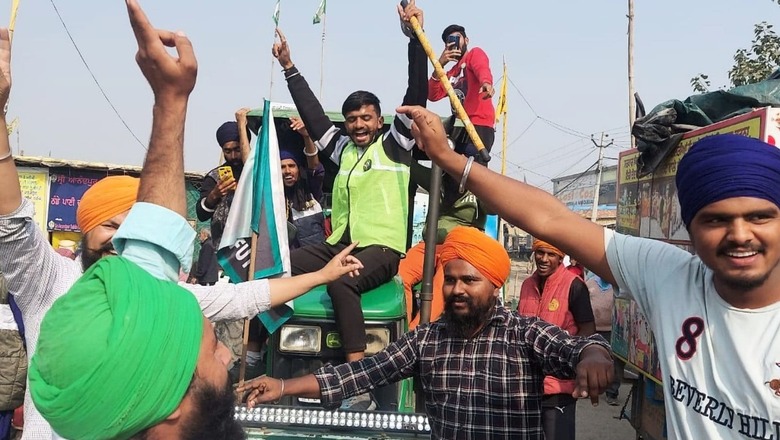
views
The farmers’ agitation may be over but farmer leaders and their agendas remain. Seeking to sustain the spirit of protest and capitalise on the constituency build-up during the year-long stir against the three farm laws, farmer leaders are entering the electoral fray.
For them, it is a carpe diem moment. They must seize the day, or lose the political clout they have accumulated through leveraging agrarian distress and scaremongering. Hence, the decision by a majority of Samyukt Kisan Morcha unions to contest the Punjab assembly elections.
The split in the SKM on this issue reflects the composition of the farmers’ movement. From Day 1, the protest attracted motley forces: many genuinely apolitical farmers’ representatives but also those serving their own vested interests or acting as a proxy platform for non-state players and political parties.
Now that the agitation has been ‘suspended’, the SKM leadership faces the challenge of retaining a base built through strategic emotional manipulation. With the immediate ‘threat’ of the farm laws alleviated, rebuilding the momentum of the agrarian movement will be difficult. Mobilising farmers politically is seen by the dominant section as a logical way forward.
As a largely urban party, it makes sense for Aam Aadmi Party (AAP) to ally, overtly or covertly, with the Samyukt Samaj Morcha comprising 22 farmers’ organisations. The fragmented political scenario in Punjab, where the incumbent Congress is riven with internal differences and the Shiromani Akali Dal (SAD) is at its lowest ebb, presents a golden opportunity for AAP. Farmer leaders, with an electorally exploitable constituency at their command, are ideal partners.
The crux of the matter is that, beyond the triumphalism of forcing a repeal of the farm laws, the average farmer has not gained. After a year of struggle, he finds himself back to square one: his debts are just as heavy, operational costs just as high, returns just as low and the risks of agriculture just as great.
To justify the sacrifices of the last year, the farmer leaders must show gains beyond the repeal of the farm laws. Otherwise, they stand to lose face. The demands for statutory MSP (minimum support price) and zero penalties for crop burning are impractical. So, what better way of demonstrating that the struggle continues than contesting elections?
Also, a political role for agrarian activists recalls the golden era of farmer leaders such as Charan Singh, Devi Lal, NG Ranga, Baldev Ram Mirdha, MD Nanjundaswamy, Mahender Singh Tikait and Sharad Joshi. The first two made it to Prime Minister and deputy PM posts.
From the 1990s until the farmers’ stir, no grassroots agrarian leader had been able to make his presence felt at the national level. Having forced the government to back down, the farmer leaders are enjoying a new-found clout.
Mobilising the farmers for such a prolonged battle was possible only because they had lost faith in the capacity of political parties to represent their interests. Despite the fact that a majority of members of Parliament describe themselves as farmers or cultivators, agrarian issues are rarely taken seriously. The impression that the corporate sector is prioritised by all governments at all levels has gained ground and was exploited by the farmers’ unions.
The SKM’s apolitical stance thus lent it credibility vis-a-vis the media and public. Although it drew support from the opposition parties, it took care to present itself as party agnostic. For their part, the opposition was only too happy to cheer from the sidelines and project the farmers’ agitation as a broader anti-BJP movement.
In the agrarian state of Punjab, however, the well-heeled farm lobby has always played a political role and has frequently influenced policy. This is so because the stakes in agriculture are higher than in any other state, particularly after two decades of steady ‘de-industrialisation’. Time after time, state governments have been forced to back down on economic reforms under pressure from the rich farmers.
The farmers’ unions have shown that agrarian discontent can be channelled to serve diverse agendas but what’s in it for the ‘aam kisan’? Granted, the political establishment may have failed the average farmer. But the question is whether the farmer leaders will be better able to address the trifecta of indebtedness, low returns and risk, which is at the heart of the farm crisis.
Bhavdeep Kang is a freelance writer and author of Gurus: Stories of India’s Leading Babas and Just Transferred: The Untold Story of Ashok Khemka. The views expressed in this article are those of the author and do not represent the stand of this publication.
Read all the Latest Opinions here
















Comments
0 comment